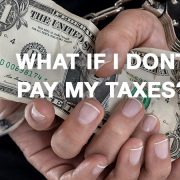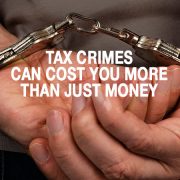Beware: Failing To Pay The IRS Could Land You In Jail
/0 Comments/in Criminal Tax Enforcement, Criminal Tax Litigation – Domestic Tax Issues, IRS Criminal Investigation Division Operation & Developments – Domestic Tax Issues /by Tax AttorneyBeware: Failing To Pay The IRS Could Land You In Jail
The IRS is notorious for taking aggressive collection action including filing tax liens, issuing wage garnishments, seizing assets and levying bank accounts in order to collect outstanding IRS debt. In some cases the IRS is also looking to make an example of what happens to taxpayers who do not cooperate in paying their taxes or even worse not filing tax returns.
Owner Of Colorado Business Sentenced To Prison For Tax Crimes.
In a press release issued by the U.S. Attorney’s Office in Colorado, Douglas A. Wieland, a Colorado paving company owner, was sentenced to prison for failure to pay income taxes. Mr. Wieland was sentenced to 12 months and one day in prison by U.S. District Judge R. Brooke Jackson in Denver, Colorado. In September 2018, Mr. Wieland pleaded guilty to two counts of failure to pay income taxes, in violation of 26 U.S.C. § 7203.
According to court documents, Mr. Wieland owned and operated Performance Paving, a company that performed asphalt and concrete work. Mr. Wieland admitted that, from April 1999 through December 2017, he did not make any payments toward his income taxes. He also admitted that he took steps to conceal his income and assets to prevent the IRS from seizing his assets. He deposited over $1.8 million into a “warehouse bank” account and then used that account to pay for his personal expenses. The purpose of a “warehouse bank” is to maintain the financial privacy of all “account holders” by commingling the funds of numerous account holders in a single bank account, usually at a domestic bank in the United States. Mr. Wieland also cashed checks his customers gave him for his services, and admitted at a court proceeding held in Adams County, Colorado, that he “cashed a check somewhere outside the box so the IRS doesn’t steal it from my bank”.
In addition to the term of imprisonment imposed, Mr. Wieland was ordered to pay restitution in the amount of $166,658.
Mr. Wieland should also expect that after serving his sentence he will be dealing with the Civil Division of the IRS who will be interested in conducting a full scale civil audit.
Penalties For Failure To File A Tax Return or Filing A False Income Tax Return or Under-reporting Income.
Failure to report all the money you make is a main reason folks end up facing an IRS auditor. Carelessness on your tax return might get you whacked with a 20% penalty. But that’s nothing compared to the 75% civil penalty for willful tax fraud and possibly facing criminal charges of tax evasion that if convicted could land you in jail.
Criminal Fraud – The law defines that any person who willfully attempts in any manner to evade or defeat any tax under the Internal Revenue Code or the payment thereof is, in addition to other penalties provided by law, guilty of a felony and, upon conviction thereof, can be fined not more than $100,000 ($500,000 in the case of a corporation), or imprisoned not more than five years, or both, together with the costs of prosecution (Code Sec. 7201).
Willful Failure To File – The law defines that any person who willfully fails to file a tax return as required by the Internal Revenue Code is, in addition to other penalties provided by law, guilty of a felony and, upon conviction thereof, can be fined not more than $25,000 ($100,000 in the case of a corporation), or imprisoned not more than five years, or both, together with the costs of prosecution (Code Sec. 7203).
The term “willfully” has been interpreted to require a specific intent to violate the law (U.S. v. Pomponio, 429 U.S. 10 (1976)). The term “willfulness” is defined as the voluntary, intentional violation of a known legal duty (Cheek v. U.S., 498 U.S. 192 (1991)).
And even if the IRS is not looking to put you in jail, they will be looking to hit you with a big tax bill with hefty penalties.
Civil Fraud – Normally the IRS will impose a negligence penalty of 20% of the underpayment of tax (Code Sec. 6662(b)(1) and 6662(b)(2)) but violations of the Internal Revenue Code with the intent to evade income taxes may result in a civil fraud penalty. In lieu of the 20% negligence penalty, the civil fraud penalty is 75% of the underpayment of tax (Code Sec. 6663). The imposition of the Civil Fraud Penalty essentially doubles your liability to the IRS!
What Should You Do?
You know that at the Law Offices Of Jeffrey B. Kahn, P.C. we are always thinking of ways that our clients can save on taxes. If you are selected for an audit, stand up to the IRS by getting representation. Tax problems are usually a serious matter and must be handled appropriately so it’s important to that you’ve hired the best lawyer for your particular situation. The tax attorneys at the Law Offices Of Jeffrey B. Kahn, P.C. located in Orange County (Irvine), Metropolitan Los Angeles (Long Beach and Ontario) and elsewhere in California are highly skilled in handling tax matters and can effectively represent at all levels with the IRS and State Tax Agencies including criminal tax investigations and attempted prosecutions, undisclosed foreign bank accounts and other foreign assets, and unreported foreign income. Also if you are involved in cannabis, check out what our cannabis tax attorneys can do for you.
Do You Have A Business That Involves Transactions In Cash? Beware Of IRS Required Filings That If Not Followed Could Lead To Penalties And Jail-time.
/0 Comments/in IRS Criminal Investigation Division Operation & Developments – Domestic Tax Issues, IRS Operations & Procedures, Voluntary Disclosure – Domestic Tax Issues /by Tax AttorneyWhile there is no law making it illegal to transact business with cash, the IRS has an interest in requiring parties to report cash transactions to deter those who evade taxes, profit from the drug trade and engage in terrorist financing and other criminal activities. The government can often trace money from these illegal activities through the payments reported on this and other cash reporting forms. This is particularly true as more and more states are allowing the sale of cannabis at the medical and/or recreational level.
Bank Secrecy Act – Reporting Of Cash Payments.
Since 1970, the Bank Secrecy Act (“BSA”) requires financial institutions in the United States to assist U.S. government agencies to detect and prevent money laundering. Specifically, the BSA requires financial institutions to keep records of cash purchases of negotiable instruments, and file reports of cash purchases of these negotiable instruments of more than $10,000 (daily aggregate amount), and to report suspicious activity that might signify money laundering, tax evasion, or other criminal activities. The BSA requires any business receiving one or more related cash payments totaling more than $10,000 to file IRS Form 8300, Report of Cash Payments Over $10,000 Received in a Trade or Business.
The minimum penalty for failing to file EACH Form 8300 is $25,000 if the failure is due to an intentional or willful disregard of the cash reporting requirements. Penalties may also be imposed for causing, or attempting to cause, a trade or business to fail to file a required report; for causing, or attempting to cause, a trade or business to file a required report containing a material omission or misstatement of fact; or for structuring, or attempting to structure, transactions to avoid the reporting requirements. These violations may also be subject to criminal prosecution which, upon conviction, may result in imprisonment of up to 5 years or fines of up to $250,000 for individuals and $500,000 for corporations or both.
Electronic Filing Of Form 8300, Report of Cash Payments Over $10,000.
Although businesses have the option of filing Form 8300, Report of Cash Payments Over $10,000, on paper, there is the option to e-filing this form especially since the deadline to file the form is 15 days after a reportable cash transaction occurs.Businesses that file Form 8300 electronically get free, automatic acknowledgment of receipt when they file and since the reporting involves no IRS personnel interaction, it could arguably lower scrutiny by the IRS. To file Form 8300 electronically, a business must first set up an account with the Financial Crimes Enforcement Network’s BSA E-Filing System.
For more information about the reporting requirement, you can check out the fact sheet put out by IRS atFS-2019-1 which among other things includes reporting scenarios for specific businesses, such as automobile dealerships, taxi companies, landlords, colleges and universities, homebuilders and bail-bonding agents.
Financial Crimes Enforcement Network (“FinCEN”).
FinCEN is a bureau of the U.S. Department of the Treasury. The Director of FinCEN is appointed by the Secretary of the Treasury and reports to the Treasury Under-Secretary for Terrorism and Financial Intelligence. FinCEN’s mission is to safeguard the financial system from illicit use and combat money laundering and promote national security through the collection, analysis, and dissemination of financial intelligence and strategic use of financial authorities.
FinCEN carries out its mission by receiving and maintaining financial transactions data; analyzing and disseminating that data for law enforcement purposes; and building global cooperation with counterpart organizations in other countries and with international bodies.
FinCEN exercises regulatory functions primarily under the Currency and Financial Transactions Reporting Act of 1970, as amended by Title III of the USA PATRIOT Act of 2001. Under this authority the Secretary of the Treasury is to issue regulations requiring banks and other financial institutions to take a number of precautions against financial crime, including the establishment of AML programs and the filing of reports that have been determined to have a high degree of usefulness in criminal, tax, and regulatory investigations and proceedings, and certain intelligence and counter-terrorism matters. This authority has been delegated to FinCEN.
The basic concept underlying FinCEN’s core activities is “follow the money.” As FinCEN believes that the primary motive of criminals is financial gain, and they leave financial trails as they try to launder the proceeds of crimes or attempt to spend their ill-gotten profits. FinCEN shares the information it receives and analyzes with other law enforcement agencies to investigate and hold accountable a broad range of criminals, including perpetrators of fraud, tax evaders, and narcotics traffickers. More recently, the techniques used to follow money trails also have been applied to investigating and disrupting terrorist groups, which often depend on financial and other support networks.
What Should You Do?
The IRS scrutinizes in any cash-based business the amount of gross receipts to report and it is harder to prove to the IRS expenses paid in cash. However, this should not undermine the importance that the proper facilities and procedures be set up to maintain an adequate system of books and records which even in an environment of running a business without a traditional bank is possible.
If your business activities involve transactions in cash you need to protect yourself and your investment by engaging the cannabis tax attorneys at the Law Offices Of Jeffrey B. Kahn, P.C. located in Orange County (Irvine), San Francisco Bay Area (including San Jose and Walnut Creek) and other California locations. We can come up with tax solutions and strategies and protect you and your business and to maximize your net profits.
San Diego Crypto Currency Trader Indicted And Held Without Bond In The U.S. For Money Laundering
/0 Comments/in Criminal Tax Enforcement, Criminal Tax Litigation – Domestic Tax Issues, Crypto-currency / Bitcoin, IRS Criminal Investigation Division Operation & Developments – Domestic Tax Issues /by Tax AttorneyDo not think that just because digital exchanges are not broker-regulated by the IRS and digital exchanges are not obligated to issue a 1099 form reporting transactions, that your crypto currency transactions will always be a secret. The Federal government is cracking down on non-compliant traders.
Charges Filed Following Investigation By Federal Authorities
The U.S. Attorney’s Office for the Southern District Of California (which serves San Diego) announced on August 17, 2018 in a press release that a bitcoin dealer, Jacob Burrell a/k/a Jacob Burrell Campos, was indicted for international money laundering and is being held without bond. Mr. Burrell was arrested on August 13, 2018 as he tried to enter the United States from Mexico at the Otay Mesa Port of Entry.
According to statements made in court by Assistant U.S. Attorney Robert Ciaffa in the August 17th bond hearing, Mr. Burrell was a prolific Bitcoin dealer who sold approximately $750,000 worth of Bitcoin to hundreds of buyers throughout the United States. He conducted 971 separate transactions with over 900 individual customers, and accepted cash in person, through his bank accounts, and through MoneyGram. AUSA Ciaffa told the court that Mr. Burrell operated as a Bitcoin “exchanger” and his activities constituted a “money transmitting business”. As such, he was required to register with the Department of Treasury, and comply with all anti-money laundering requirements, including reporting suspicious cash transactions. In this case, Mr. Burrell accepted cash “with no questions asked” and in return for a 5% fee, supplied hundreds of individuals with an easy outlet to avoid the anti-money laundering laws applicable to all financial institutions, including licensed and registered Bitcoin exchanges. According to AUSA Ciaffa, Mr. Burrell’s activities “blew a giant hole” through the legal framework of U.S. anti-money laundering laws by soliciting and introducing into the U.S. banking system close to $1 million in unregulated cash.
18 U.S.C. §1956 – Laundering Of Monetary Instruments
18 U.S.C. § 1956(a) defines three types of criminal conduct: domestic money laundering transactions (§ 1956(a)(1)); international money laundering transactions (§ 1956(a)(2)); and undercover “sting” money laundering transactions (§ 1956(a)(3)). Crypto currency traders and marijuana-related businesses need to be aware of domestic money laundering transactions (§ 1956(a)(1)).
To be criminally culpable under 18 U.S.C. § 1956(a)(1), a defendant must conduct or attempt to conduct a financial transaction, knowing that the property involved in the financial transaction represents the proceeds of some unlawful activity, and the property must in fact be derived from a specified unlawful activity.
Violations of § 1956 have a maximum potential 20-year prison sentence and a $500,000 fine or twice the amount involved in the transaction, whichever is greater. There is also a civil penalty provision in § 1956(b) which may be pursued as a civil cause of action. Under this provision, persons who engage in violations of any of the subsections of 1956(a) are liable to the United States for a civil penalty of not more than the greater of $10,000 or the value of the funds involved in the transaction.
Mr. Burrell is being charged with 28 counts of money laundering. Each conviction for money laundering carries a maximum penalty of 20 years in prison and/or a $500,000 fine or twice the amount involved in the transaction, whichever is greater.
Other charges and possible punishment in the indictment include:
- Conducting an unlicensed money transmitting business, in violation of 18 USC 1960. Statutory maximum: Five years in prison, $250,000 fine.
- Failing to maintain an anti-money laundering program, in violation of 18 USC 5318(h), 5322(b). Statutory maximum: Ten years in prison, $500,000 fine.
- Conspiracy to structure international instrument transactions, in violation of 18 USC 371 and 31 USC 5324(c)(3). Statutory maximum: Five years in prison, $250,000 fine.
Indictment Culminated Investigation By Multiple Federal Agencies
The Department Of Homeland Security (Homeland Security Investigation Unit), Postal Inspection Service and the Internal Revenue Service investigated this case.
U.S. Magistrate Judge Karen S. Crawford found that Mr. Burrell had significant ties to Mexico, citizenship in three countries, no steady employment in the United States, the ability to access large sums of cash, and a disdain and unwillingness to comply with U.S. laws. She concluded at the August 17th bond hearing that Mr. Burrell posed a substantial risk of flight, and ordered him held without bail.
Keep in mind that the charges and allegations by U.S. Attorneys’ Office are merely accusations and the defendant is considered innocent unless and until proven guilty. However, regardless of the outcome of this indictment you can bet that Mr. Burrell will likely have to face the Civil Division of the Internal Revenue Service.
What Should You Do?
The IRS is always interested in teaming up with other Federal agencies in their investigations of non-compliance with the laws and with only several hundred people reporting their crypto gains each year, the IRS suspects that many crypto users have been evading taxes by not reporting crypto transactions on their tax returns. Don’t delay because once the IRS has targeted you for investigation – even if it is a routine random audit – it will be too late voluntarily come forward. Let the tax attorneys at the Law Offices Of Jeffrey B. Kahn, P.C. located in Orange County (Irvine), San Francisco Bay Area (including San Jose and Walnut Creek) and offices elsewhere in California get you set up with a plan that may include being qualified into a voluntary disclosure program to avoid criminal prosecution, seek abatement of penalties, and minimize your tax liability.
IRS Targeting Taxpayers With Unreported Foreign Income And Undisclosed Foreign Bank Accounts
/0 Comments/in Audits, Criminal Tax Enforcement, Disclosures of Foreign Income Producing Property, Disclosures of Foreign Trusts and Interests In Foreign Entities, FBAR, Foreign Accounts - Tax Information Sharing, Foreign Accounts – IRS Operations & Investigation Developments, IRS Criminal Investigation Division Operation & Developments – Domestic Tax Issues, IRS Operations & Procedures, Offshore Voluntary Disclosure Program (OVDP), Undisclosed Foreign Bank Accounts & Unreported Foreign Income /by Tax AttorneyLos Angeles Crypto Currency Trader Convicted For Money Laundering And Sentenced To One Year In Prison
/0 Comments/in Criminal Tax Enforcement, Criminal Tax Litigation – Domestic Tax Issues, Crypto-currency / Bitcoin, IRS Criminal Investigation Division Operation & Developments – Domestic Tax Issues /by Tax AttorneyDarknet Narcotics Vendors Selling to Thousands of U.S. Residents Accused Of Tax Crimes
/0 Comments/in Criminal Tax Enforcement, Criminal Tax Litigation – Domestic Tax Issues, IRS Criminal Investigation Division Operation & Developments – Domestic Tax Issues, Marijuana Tax Planning & Marijuana Tax Defense /by Tax AttorneyKeep In Touch
MEET US IN PERSON
Services
- Abatement of Tax Penalties
- Audits And Tax Court
- Business Transactions
- Cannabis / Marijuana Tax Services
- Criminal Tax Investigations
- Crypto-currency / Bitcoin – Tax Representation Services
- Currently Not Collectible
- Delinquent Tax Returns
- Employment And Payroll Taxes
- Entity Formations
- Estate Planning
- Estate Planning For Non US Citizens
- Estate Tax Planning
- FATCA | Foreign Account Reporting Compliance
- FBAR | Foreign Bank Account Reporting
- Full Pay Service
- Income Tax Planning
- Innocent Spouse Claims
- IRS & State Tax Controversies
- IRS Offshore Tax Investigations
- IRS Offshore Tax Investigations
- IRS State Tax Controversies
- Offers In Compromise
- Payment Agreements
- Representation Of Tax Preparers And Other Tax Professionals
- Revenue Officer Assistance
- Tax & Estate Plannng
- Tax Liens And Levies
- Wage Garnishment










 Follow
Follow Follow
Follow